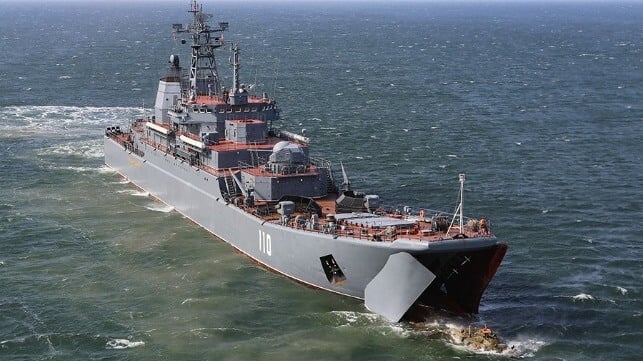Russian Warship Was Loitering Off Denmark During Drone Attacks

After a coordinated drone raid shut down Copenhagen Airport and grounded dozens of flights, investigators' attention quickly turned to possible maritime launch pads. Three Russia-linked vessels were in the general vicinity during or just after the attacks, and one of them appeared to have slowed down in order to time its arrival in the Oresund, just a few cables away from the airport. But a fourth vessel has also attracted attention: a Russian amphib, which has been loitering at the edge of Danish territorial seas for days.
Danish tabloid Ekstra Bladet first broke the news of the vessel's presence on Thursday. Using a chartered helicopter, the outlet's reporter flew out to observe the Ropucha-class landing ship Aleksandr Shabalin at a position off the coast of Langeland, an island at the southern entrance to the Great Belt. Shabalin was navigating with her AIS off, as is common for warships.
According to the outlet, Shabalin has been in the area for days, during a time period of intense drone activity at Danish airports and military sites. Jacob Kaarsbo, former head analyst of Denmark's military intelligence service, told Ekstra Bladet that the ship could have served a few roles - as a diversionary measure, an observational platform, or as a backstop for Russia-linked merchant vessels involved in launching drones.
Authorities in Denmark have confirmed that the Shabalin is part of the ongoing investigation into drone activity.

that matters most
Get the latest maritime news delivered to your inbox daily.
As to the source of the drone raid, Danish authorities are for now holding back their opinions. But Prime Minister Mette Frederiksen said Thursday that there would likely be more attacks, and warned that "what we are experiencing in Denmark at the moment is a hybrid war," similar to incidents seen elsewhere in Europe.
The current head of Denmark's defense intelligence agency, Thomas Ahrenkiel, used a similar term Thursday in describing Russian methods. "Since 2022 they have shown greater risk-taking in carrying out hybrid attacks," he said.
